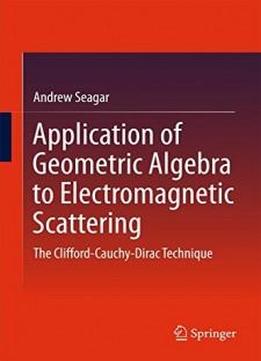
Application Of Geometric Algebra To Electromagnetic Scattering: The Clifford-cauchy-dirac Technique
by Andrew Seagar /
2015 / English / EPUB
3 MB Download
This work presents the Clifford-Cauchy-Dirac (CCD) technique for
solving problems involving the scattering of electromagnetic
radiation from materials of all kinds.
This work presents the Clifford-Cauchy-Dirac (CCD) technique for
solving problems involving the scattering of electromagnetic
radiation from materials of all kinds.
It allows anyone who is interested to master techniques that lead
to simpler and more efficient solutions to problems of
electromagnetic scattering than are currently in use. The
technique is formulated in terms of the Cauchy kernel, single
integrals, Clifford algebra and a whole-field approach. This is
in contrast to many conventional techniques that are formulated
in terms of Green's functions, double integrals, vector calculus
and the combined field integral equation (CFIE). Whereas
these conventional techniques lead to an implementation using the
method of moments (MoM), the CCD technique is implemented as
alternating projections onto convex sets in a Banach space.
It allows anyone who is interested to master techniques that lead
to simpler and more efficient solutions to problems of
electromagnetic scattering than are currently in use. The
technique is formulated in terms of the Cauchy kernel, single
integrals, Clifford algebra and a whole-field approach. This is
in contrast to many conventional techniques that are formulated
in terms of Green's functions, double integrals, vector calculus
and the combined field integral equation (CFIE). Whereas
these conventional techniques lead to an implementation using the
method of moments (MoM), the CCD technique is implemented as
alternating projections onto convex sets in a Banach space.
The ultimate outcome is an integral formulation that lends itself
to a more direct and efficient solution than conventionally is
the case, and applies without exception to all types of
materials. On any particular machine, it results in either a
faster solution for a given problem or the ability to solve
problems of greater complexity. The Clifford-Cauchy-Dirac
technique offers very real and significant advantages in
uniformity, complexity, speed, storage, stability, consistency
and accuracy.
The ultimate outcome is an integral formulation that lends itself
to a more direct and efficient solution than conventionally is
the case, and applies without exception to all types of
materials. On any particular machine, it results in either a
faster solution for a given problem or the ability to solve
problems of greater complexity. The Clifford-Cauchy-Dirac
technique offers very real and significant advantages in
uniformity, complexity, speed, storage, stability, consistency
and accuracy.











